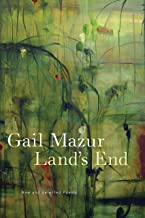Land’s End: New and Selected Poems by Gail Mazur 2020
Mazur is a Cambridge poet with strong ties to Provincetown. I came to know her poetry initially because she was married to Michael Mazur, a well known artist, whose works on paper we’ve been collecting for some time. His death and absence is a major presence in these poems.
Mazur writes the kind of poetry that I love—accessible (often a pejorative term in poetry circles), deeply feeling, drawing upon her family and its past, and immersed in nature. She writes poems for the same reason that many authors write essays or fiction, i.e. trying to sort out her feelings and understanding of this world that we live in filled with both beauty and tragedy. It was a simple pleasure reading about her Jewish great-grandfather in Maine, her conflicts with her mother, her adolescent angst, her deep love for her late husband, and her devotion to his beloved Cape, Stanley Kunitz, and her other poet friends. The occasional, surprise of ‘just the right words’ was always there and often delighted. In an example of the wonderful connections that reading often leads to, one of her best poems is entitled ‘Borges in Cambridge, 1967’, a reference to the Argentinian writer’s Norton Lectures at Harvard the year I graduated from there and an unintended connection to the last book I read.
The book is unusual in presenting the new poems first. Most ‘new and selected’ volumes are arranged chronologically, perhaps to give the reader a sense of the poet’s development. I liked this arrangement with Mazur leading off with her best and most mature work. There are fewer selections from each volume working back into time until the sole poem “Baseball” from her first book published in 1978. Good decision on format.
If you like poetry and if you live in Cambridge or hang out in Provincetown, this is the ideal book to dip into or read straight through. Either way, you will enjoy it, and, like me, very much want to sit in a coffee shop and shoot the breeze with Gail Mazur.
Here’s a brief selection from her poem, ‘End of Summer’: “Soon all but the gulls would leave, their season here over, and I, too, would leave./ When I walked back to the shore over tide-strewn pebbles and the jagged/ shells of oysters and scallops and crabs, my feet had become a child’s feet again,/ uncomplaining, pliant./ Time had gone by, but in those moments, there was no pain. I recalled nothing/ of grief or fear or despair./ Grief, fear, despair — as if I were sleepwalking, those were not the elements of/ that August afternoon.”



